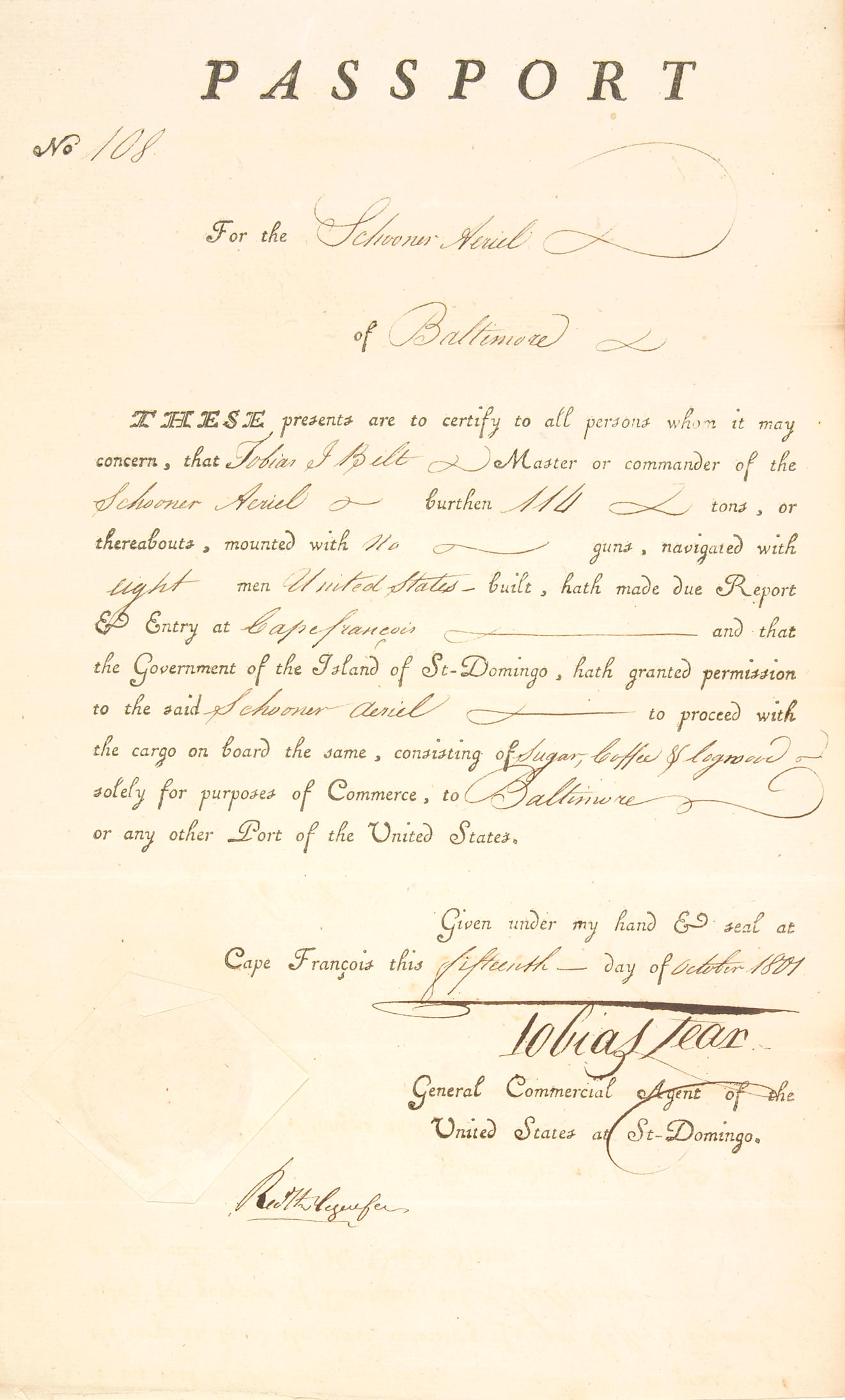LEAR, Tobias (1762-1816), Washington's secretary, Diplomat . Letter signed ("Tobias Lear"), to Charles D. Coxe, Algiers, 11 february 1810. 4 pages, quarto .
LEAR, Tobias (1762-1816), Washington's secretary, Diplomat . Letter signed ("Tobias Lear"), to Charles D. Coxe, Algiers, 11 february 1810. 4 pages, quarto . "OUR AFFAIRS WITH ENGLAND ARE ALSO VERY DARK..." A long and rich letter from one American diplomat to another (Coxe was chargé des affaires in Tunis), discussing the major international tensions that would soon plunge the country into war with Britain. "I am very sorry," Lear writes Coxe, "to find so many of our vessels have been detained by French privateers; and sent into Tunis, as I am sure it must give you a great deal of trouble and may cause some unpleasant discussions. I am persuaded that every thing in your power will be done to relieve our Citizens and their property; and it has been a pleasing circumstance to find His Excellency the Bey disposed to do us all the justice in his power upon these occasions. It will be fully stated to our Government and I have no doubt duly appreciated by them." After a discussion of the payment of various expense accounts, Lear says "The Interest of the U. States in Tunis has become more important in consequence of so many of our vessels having been carried in them by French privateers; and it would be very much regretted if the State of your health should make it necessary for you to quit the place at this time..." He then passes on the intelligence he received in a letter from Marseilles, reporting that 15 American vessels in Naples had their cargoes confiscated and sold. His correspondent "also adds that there is no appearance of any settlement between the U. States & France, to relieve our commerce from its embarrassments. Our affairs with England are also very dark. The conduct of Mr. Jackson having made it necessary for the President to break off all communication with him and desire his recall." Mr. Jackson refers to Francis James Jackson, the British ambassador to the U.S. until war broke out between the two countries in 1812. Lear's letter vividly shows the extent of French as well as British harassment of American shipping during the Napoleonic Wars. President Madison tried to gain some leverage against the superpowers by signing into law Macon's Bill No. 2 in 1810, by which America pledged to resume trading with the first of the two powers to cease attacking American vessels, and to continue the embargo against the other. Napoleon snapped up the offer first, clearing the way for armed confrontation between America and Britain. A fine diplomatic letter.
LEAR, Tobias (1762-1816), Washington's secretary, Diplomat . Letter signed ("Tobias Lear"), to Charles D. Coxe, Algiers, 11 february 1810. 4 pages, quarto .
LEAR, Tobias (1762-1816), Washington's secretary, Diplomat . Letter signed ("Tobias Lear"), to Charles D. Coxe, Algiers, 11 february 1810. 4 pages, quarto . "OUR AFFAIRS WITH ENGLAND ARE ALSO VERY DARK..." A long and rich letter from one American diplomat to another (Coxe was chargé des affaires in Tunis), discussing the major international tensions that would soon plunge the country into war with Britain. "I am very sorry," Lear writes Coxe, "to find so many of our vessels have been detained by French privateers; and sent into Tunis, as I am sure it must give you a great deal of trouble and may cause some unpleasant discussions. I am persuaded that every thing in your power will be done to relieve our Citizens and their property; and it has been a pleasing circumstance to find His Excellency the Bey disposed to do us all the justice in his power upon these occasions. It will be fully stated to our Government and I have no doubt duly appreciated by them." After a discussion of the payment of various expense accounts, Lear says "The Interest of the U. States in Tunis has become more important in consequence of so many of our vessels having been carried in them by French privateers; and it would be very much regretted if the State of your health should make it necessary for you to quit the place at this time..." He then passes on the intelligence he received in a letter from Marseilles, reporting that 15 American vessels in Naples had their cargoes confiscated and sold. His correspondent "also adds that there is no appearance of any settlement between the U. States & France, to relieve our commerce from its embarrassments. Our affairs with England are also very dark. The conduct of Mr. Jackson having made it necessary for the President to break off all communication with him and desire his recall." Mr. Jackson refers to Francis James Jackson, the British ambassador to the U.S. until war broke out between the two countries in 1812. Lear's letter vividly shows the extent of French as well as British harassment of American shipping during the Napoleonic Wars. President Madison tried to gain some leverage against the superpowers by signing into law Macon's Bill No. 2 in 1810, by which America pledged to resume trading with the first of the two powers to cease attacking American vessels, and to continue the embargo against the other. Napoleon snapped up the offer first, clearing the way for armed confrontation between America and Britain. A fine diplomatic letter.


.jpg)












Testen Sie LotSearch und seine Premium-Features 7 Tage - ohne Kosten!
Lassen Sie sich automatisch über neue Objekte in kommenden Auktionen benachrichtigen.
Suchauftrag anlegen